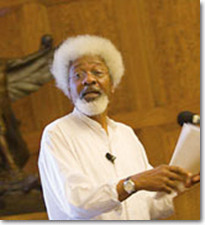Wole SOYINKA
Wole Soyinka was born on 13 July 1934 at Abeokuta, near Ibadan in western Nigeria. During the six years of study he spent in England, he was a dramaturgist at the Royal Court Theatre in London 1958-1959. In 1960, he was awarded a Rockefeller bursary and returned to Nigeria to study African drama. In 1960, he founded the theatre group, "The 1960 Masks" and in 1964, the "Orisun Theatre Company", in which he has produced his own plays and taken part as actor.
During the civil war in Nigeria, Soyinka appealed in an article for cease-fire. For this he was arrested in 1967, accused of conspiring with the Biafra rebels, and was held as a political prisoner for 22 months untill 1969.
As dramatist, Soyinka has been influenced by, among others, the Irish writer, J.M. Synge, but links up with the traditional popular African theatre with its combination of dance, music, and action. He bases his writing on the mythology of his own tribe-the Yoruba-with Ogun, the god of iron and war, at the centre. He wrote his first plays during his time in London, The Swamp Dwellers and The Lion and the Jewel (a light comedy), which were performed at Ibadan in 1958 and 1959 and were published in 1963.
He was awarded the 1986 Nobel Prize in Literature, and became the first African to be so honoured. In 1994, he was designated Goodwill Ambassador for the promotion of African culture, human rights, freedom of expression, media and communication.


